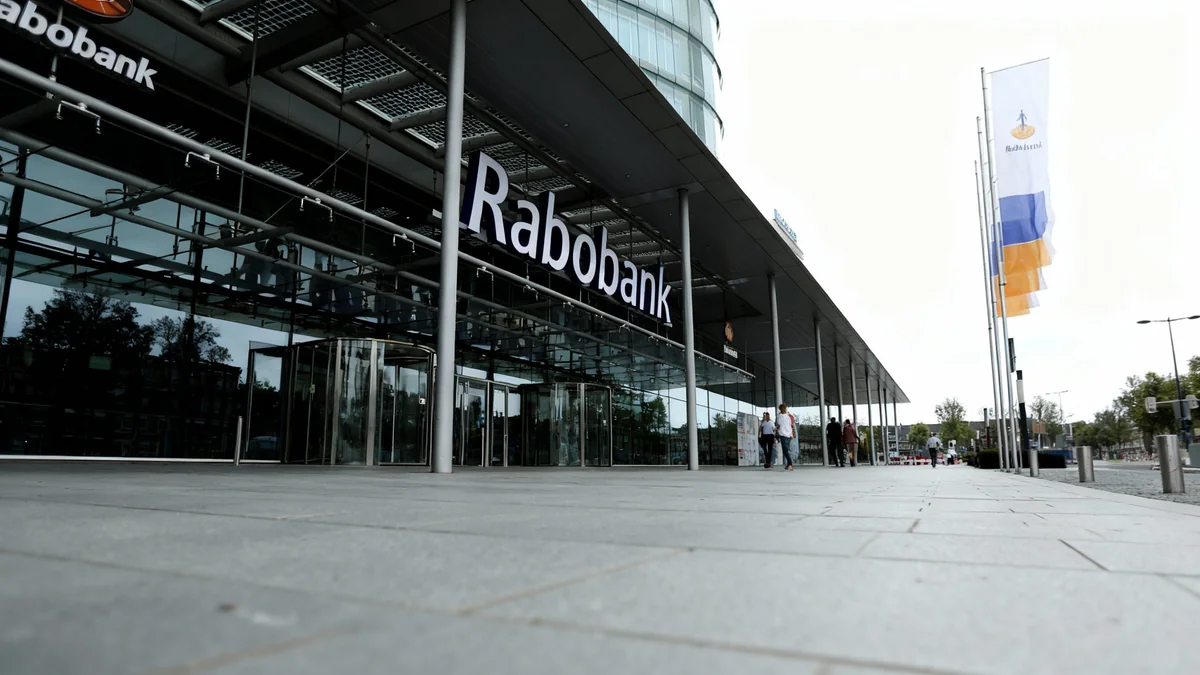Dutch banking giant Rabobank has entered into a landmark €1 billion agreement with pension investment firm PGGM to share credit risk on a substantial portfolio of Dutch commercial real estate. The deal signals a strategic move by financial institutions to insulate themselves from potential volatility in the property market.
Announced on Monday, the transaction involves a significant risk transfer (SRT) on loans tied to Dutch commercial properties. This arrangement allows Rabobank to manage its risk exposure while providing PGGM an investment opportunity linked to the performance of the real estate loans.
Key Takeaways
- Rabobank and PGGM finalized a €1 billion credit risk sharing agreement.
- The deal focuses on a portfolio of Dutch commercial real estate loans.
- This is Rabobank's first significant risk transfer (SRT) transaction dedicated entirely to commercial property.
- The move reflects growing caution in the European property sector, where sales have hit multi-year lows.
A Strategic Partnership in a Cautious Market
The collaboration between Rabobank and PGGM comes at a time of increasing uncertainty across European financial markets. With property sales slowing to their lowest levels in years, banks are actively seeking innovative ways to hedge their financial exposure and strengthen their balance sheets against a potential downturn.
This transaction allows Rabobank to transfer a portion of the credit risk associated with its commercial real estate loan book to PGGM. In return, PGGM, which manages pensions for millions in the Netherlands, gains exposure to a diversified asset class that can offer stable returns, provided the underlying loans perform as expected.
Peter de Bruin, head of Rabobank Real Estate Finance, highlighted the importance of this specific agreement.
"This marks Rabobank's first SRT (significant risk transfer) transaction fully focused on commercial real estate," he stated, underscoring the novelty and strategic focus of the deal.
Understanding Significant Risk Transfers
Significant risk transfers are financial instruments that have become increasingly popular among banks, especially following stricter capital requirement regulations. They are not new, but their application specifically to large commercial real estate portfolios is a noteworthy development.
How Do SRTs Work?
In a typical SRT, a bank identifies a specific portfolio of loans on its books. It then partners with an investor, such as a pension fund or private equity firm, who agrees to cover a certain amount of potential losses on that portfolio in exchange for regular payments or a share of the interest income. This effectively acts as a form of insurance for the bank, freeing up capital that would otherwise be held against potential loan defaults.
For Rabobank, this €1 billion transaction means it can reduce the amount of regulatory capital it must hold against these property loans. This freed-up capital can then be used for new lending activities, strengthening the bank's overall financial position and ability to support the economy.
For an institutional investor like PGGM, the appeal lies in the yield. These transactions can offer attractive returns compared to more traditional fixed-income investments, especially in a low-interest-rate environment. However, they also carry the risk of absorbing losses if the economic climate worsens and borrowers begin to default.
A Growing Trend in Europe
The Rabobank-PGGM deal is not an isolated event. Just last month, Italian bank Intesa confirmed it had shifted the credit risk on a massive €29 billion portfolio of its assets. This trend indicates a broader, sector-wide strategy among European banks to proactively manage risk.
The State of Dutch Commercial Real Estate
The Dutch commercial real estate market, like many across Europe, is navigating a complex post-pandemic landscape. While certain sectors like logistics and modern office spaces have shown resilience, others, such as retail and older office buildings, face significant headwinds.
Factors influencing the market include:
- Rising Interest Rates: Higher borrowing costs have made financing new deals more expensive and have put pressure on existing property valuations.
- Economic Uncertainty: Concerns about a potential recession can dampen demand for commercial space as businesses delay expansion plans.
- Remote Work Trends: The shift to hybrid and remote work models has fundamentally altered the demand for traditional office space, a core component of many commercial real estate portfolios.
This environment of caution makes risk-sharing agreements particularly valuable. By partnering with PGGM, Rabobank can maintain its lending to the commercial real estate sector while prudently managing the associated risks. It demonstrates a forward-looking approach to navigating potential market shifts without pulling back from a critical area of the Dutch economy.
Implications for the Broader Financial System
The increasing use of SRTs has wider implications for the financial industry. It shows a maturation of risk management techniques, where banks and institutional investors create symbiotic relationships. Banks gain balance sheet flexibility, while long-term investors like pension funds find new avenues for yield.
This particular deal, with its exclusive focus on commercial property, will be closely watched. Its success could pave the way for similar transactions across Europe, providing a new model for how banks manage large, concentrated exposures to specific sectors.
Ultimately, the €1 billion agreement is a clear indicator of the current financial climate. It reflects a sophisticated, proactive approach to risk management in an uncertain world, where major financial players are building buffers to ensure stability, no matter what the economic future holds.





